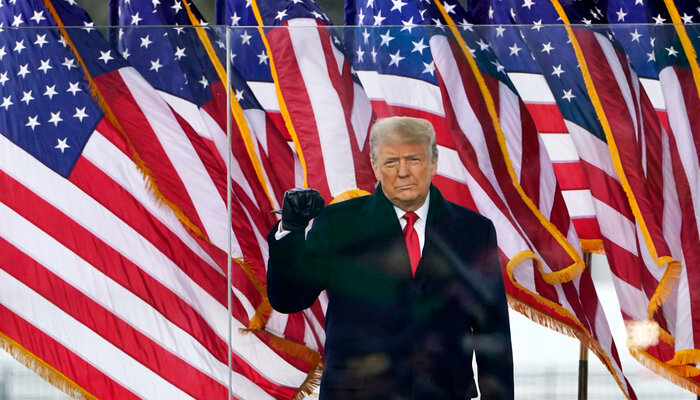The Constitution gives the president the “Power to grant Reprieves and Pardons for Offences against the United States, except in Cases of Impeachment.” When it comes to reducing our prison populations, we’ve argued that this power should be used more frequently as a vital mechanism of mercy, tempering the often harsh, racist, and inequitable effects of our criminal legal system.
But the pardon power also comes with the risk of abuse. Never has this been more apparent than under President Trump, who has used it to grant clemency to people convicted of crimes relating to his presidential campaign. And now, Trump is reportedly considering trying to pardon himself for a variety of crimes, which would be unprecedented.
Why is Trump considering pardoning himself?
The most recent reason is his role in inciting the deadly insurrection at the Capitol Wednesday, when he told a crowd of supporters in front of the White House that the election was stolen and instructed them to “walk down to the Capitol” where Congress was counting the Electoral College votes. The Justice Department said that it was not ruling out charging Trump for inciting a riot, with the U.S. attorney in Washington saying, “All options are on the table. … We will look at every actor and all criminal charges.”
Since making that statement, the DOJ has softened its position, with one official calling it a “moonshot” that “there’s any hook for criminal liability for Trump.” But even if Trump dodges prosecution now, nothing will stop the Biden DOJ, based on its review of the law and facts, from prosecuting Trump for inciting the riot. And Biden’s attorney general pick Merrick Garland condemned Wednesday’s riots and noted that today’s priorities, “from ensuring racial equity in our justice system to meeting the evolving threat of violent extremism,” are ones that he will be devoted.
The other recent reason is illegal election interference — specifically, Trump’s January phone call to Georgia Secretary of State Brad Raffensperger in which the president asked him to “find 11,780 votes” to change the outcome of the presidential vote in the state.
News of the call prompted Reps. Ted Lieu (CA) and Kathleen Rice (NY) to ask the FBI to open a criminal investigation into the matter, saying that they believe the president has engaged in “solicitation of, or conspiracy to commit, a number of election crimes.”
Back in 2017, the Washington Post reported that Trump consulted with his advisors on the legal authority to self-pardon when he was under investigation by Special Counsel Robert S. Mueller III as part of the Russia probe.
Could Mike Pence pardon Trump if he resigns or is removed from office by impeachment or under the 25th Amendment?
Yes. The only president who has ever obtained a pardon was Richard Nixon. After he resigned, his successor, President Gerald Ford, granted him a full pardon for any crimes that he might have committed against the United States as president, shielding Nixon from criminal charges related to the Watergate scandal.
Would a presidential self-pardon be constitutional?
The answer is unclear. While neither the text of the Constitution nor judicial precedent explicitly resolves the matter, a 1974 Justice Department memo contended that a self-pardon would collide with “the fundamental rule that no one may be a judge in his own case.” The only way to answer this question, then, is for Trump to pardon himself and subsequently be indicted for a federal crime for which he had pardoned himself. That, in turn, would create the opportunity for the courts to settle the debate.
The bipartisan National Task Force on Rule of Law & Democracy has called for Congress to pass a resolution expressly and categorically condemning self-pardons.
How would a self-pardon affect state prosecutions?
The Constitution only grants the ability to pardon people of federal crimes, so even if the courts found that the president could pardon himself, it would not excuse him from violations of state laws, several of which he is in danger of being prosecuted for.
Following the release of Trump’s call with Raffensperger, where the president may have violated state laws against election interference, the Fulton County district attorney released a statement declaring that “Anyone who commits a felony violation of Georgia law in my jurisdiction will be held accountable.”
President Trump is also in legal peril in New York, where he is facing a string of investigations. The state’s attorney general, Letitia James, is looking into the financial dealings of Trump and the Trump Organization. And Cyrus Vance Jr., the Manhattan district attorney, is investigating the president and the Trump Organization on suspicion of bank and insurance fraud.
Predicting that the president might attempt to self-pardon, New York State enacted legislation in October 2019 permitting state prosecutions when a person — even President Trump himself — has received a presidential pardon for federal crimes that could be the basis of state or local crimes.
How has Trump used the clemency power so far compared with the past?
President Barack Obama granted more than 1,700 commutation requests, more than every other president over the previous half-century combined. Yet 7,881 petitions were never reviewed.
Thus far, President Trump has granted just over 90 pardons and commutations, primarily to his friends and political allies. And he has talked about adding himself to that list: in 2018, he tweeted, “As has been stated by numerous legal scholars, I have the absolute right to PARDON myself.”
Meanwhile, there are thousands of people who are potentially appropriate clemency candidates sitting in federal prison. The Biden administration must make more broad-based use of the clemency power, which will provide some relief to those serving particularly harsh mandatory sentences, correct for unwarranted disparities among codefendants, and give retroactive effect to recent changes in the law.








